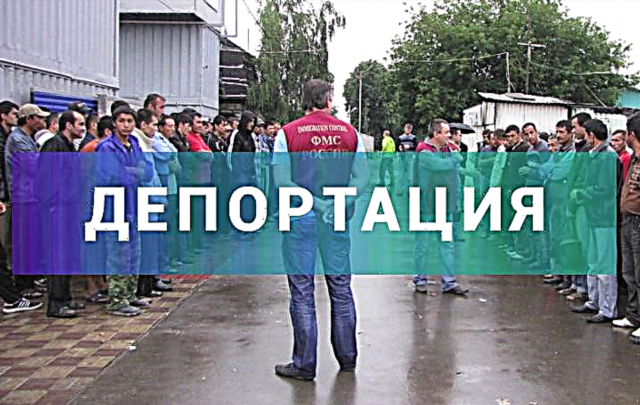Russia is a country open for foreign citizens to enter its territory. However, its migration services retain the right to expel visitors back if they do not comply with the rules of stay in the state.
What is deportation
This is the voluntary or forced removal from the territory of the state of foreigners or stateless people who violate local legislation. Deportation from Russia is carried out by employees of the Main Directorate of Internal Affairs of the Ministry of Internal Affairs of the Russian Federation.
The types of legal expulsion of foreigners are determined by the reasons causing it:
1. Derogation from the terms of stay on a visa... A person who deliberately or unintentionally exceeded his visa deadline, voluntarily leaves the country. A mark about the committed violation is put in the passport. Border service officers can add the name of the offender to the black list, if the latter does not have mitigating circumstances:
- One-day delay in visa;
- Possession of a residence permit in Russia and / or the presence of extraneous reasons for being late (weather conditions, illness, etc.) if the visa is overdue for a month;
- Payment of a fine (5-7 thousand rubles) and / or obtaining special permission (participation in the resettlement program) in case of any violation of the visa deadlines.
Persons on the black list may further be subject to restrictive measures when visiting Russia (shortening the length of stay and social opportunities). An entry in the black list can be canceled by a court decision (in connection with the clarification of new circumstances).

2. Illegal existence. The absence of a visa, temporary residence permit, residence permit or Russian citizenship of a foreigner obliges him to voluntarily leave within two weeks (from the moment of his discovery by the supervisory authorities). The consequence of a delay in departure may be forced eviction, depriving a person of the right to come again for 3 years.
3. Administrative offenses. If a foreigner violates the administrative laws of the Russian Federation (forging documents, entering into an illegal marriage, providing paid sexual services, etc.), he is expelled with the use of sanctions:
- Recovery of a fine (depending on the type of violation);
- Impossibility to enter within 3 years (for 2 violations) and 5 years - for a greater number of violations;
- Indefinite deprivation of the right to obtain Russian citizenship.
This also includes expulsion for non-payment of any government fines (improper parking, using public transport without a ticket, etc.). When all debts are paid off, the decision on expulsion is withdrawn. Otherwise, the offender is expelled with a five-year ban on the next entry.
4. Criminal offenses. A foreigner involved in the transport of persons in an illegal position, drug and slave trade, organized crime groups and the like, is expelled from the country forever. The offender also faces imprisonment (on the territory of the Russian Federation (before expulsion) or in his home state).
5. Illegal border crossing. A foreigner who provides inaccurate information about himself upon entry and has invalid documents is deported using the following measures:
You May Also Like
- Cancellation of a visa (optional);
- A fine of up to 200 thousand rubles (for persons with a ban on entry - up to 300 thousand rubles);
- In case of non-payment of the fine - a ban on entry into the country (up to 5 years - for ordinary people, indefinitely - for persons who previously had a time limit on entry).
Who can be sent and why
Only foreign citizens are at risk:
1. Living in the Russian Federation anonymously (without real documents). An attempt to perform any action with the help of a fake TRP, residence permit or foreign passport (renting a house, getting a job, taking a loan from a bank, etc.) inevitably leads to deportation with a ban on returning for 5 years.
If the victim has lost their passport, they should apply to the local police station and get a certificate of the incident. Then you need to submit a request to the consular mission in order to register a new foreigner or a certificate of return to your homeland. The loss of the rest of the documents (residence permit, migration card) is replenished upon the fact of applying with the corresponding request to the department of the Main Directorate of Internal Affairs of the Ministry of Internal Affairs.
2. Violating the rules of crossing the state border. The basis for expulsion will be the fact of illegal entry into the country recorded by the border service.
3. Not complying with the internal laws of Russia. The reason for expulsion is a violation of administrative or criminal law.
4. Deprived of sufficient grounds for further residence in the Russian Federation. This paragraph applies to citizens who have "immunity" from deportation:
- Refugees (expelled in the event of the disappearance of the reasons for refugee: the end of the war, famine or natural disasters on the territory of their native state);
- Asylum holders (deported when personal persecution ceases);
- Employees of diplomatic and consular missions (must return to their homeland in the event of their dismissal from work).
How the expulsion takes place and who pays for it
The person subject to expulsion is notified (in writing or orally) of the need to leave (voluntarily) the state.
If the notification is ignored, the designated person is sent forcibly:
You May Also Like
- Summons or detention with transfer to the migration service;
- The issuance of a deportation sentence by a civil court in the presence of the detainee;
- Applying the appropriate stamps in the passport and migration card;
- Keeping in a special isolated room until the moment of departure (no later than the 3rd day, if the documents are canceled - no later than the 14th day);
- Direct expulsion. The person is notified of the consequences of violating the ban on entry into the country (criminal prosecution). It is reported when it will be possible to visit Russia again and how much should be paid for carrying out the deportation.
The costs of the procedure can be paid by:
- Deported person (standard);
- The party at the invitation of which the foreign citizen was in Russia;
- The diplomatic mission of the state to whose territory the deported person is returning.
If it is not possible to use the main sources, payment is made at the expense of the budget money of the Russian Federation.
How to find out about the danger of expulsion on the FMS website
A situation is possible in which the decision to deport a person has been made, but it is not possible to notify him of this in due time. In order not to undergo an unpleasant forced eviction procedure, you should look in advance on the website of the GUVM of the Ministry of Internal Affairs (FMS) for information about your situation.
Procedure:
1. Go to the site "GUVM.MVD.RF";

2. Go to "Useful services of the Ministry of Internal Affairs of Russia" (at the bottom of the page);

3. Enter the "Migration Services" (bottom window);

4. Select the tab "Checking the existence of grounds for not allowing foreign citizens and stateless persons to enter the territory of the Russian Federation through the Ministry of Internal Affairs of Russia" (far right in the fourth row);

On the page that opens, you need to fill out a questionnaire (name, surname, gender, date of birth, citizenship, type and number of the main document, name of the state that granted citizenship must be indicated). Enter the test code from the picture and send a request.
The result of the check is issued within a few minutes.
Cancellation of the deportation decision
A deported foreigner has the right to put forward and confirm (during the court session) several sufficient grounds for continuing his life in Russia (one is enough):
- Possession of family ties in the Russian Federation;
- Residence permit registration;
- Owning a patent for work in Russia;
- The presence of a wife (husband) who has Russian citizenship;
- Obtaining education at a higher educational institution with Russian accreditation;
- Undergoing treatment in a state Russian medical institution.
Appealing the verdict
A positive court verdict on the deportation of a foreign citizen can be appealed against within 3 months (from the date of issue). The request is submitted to a higher court of law related to the legal space of the Russian Federation, or the ECHR.
When the body decides to consider the appeal, the deported person is released from the isolated premises of the migration service until the end of the trial. If the deportation has already taken place, the deported person can freely return to the Russian Federation and remain on its territory until a new sentence is passed.
How to return to Russia
The possibility of return depends on the reasons for the expulsion. A person who has committed serious offenses will not be able to enter the country again under the current (2021) conditions. If a period has been set during which arrival is impossible, you should only wait until it ends. In case of a successful appeal against the deportation decision, all prohibitions are lifted.

An exception to the general rule is made for expelled foreigners who subsequently found themselves (of their own free will or in addition to it) in one of the three groups of persons with "immunity" from deportation (indicated at the end of the second part of this article).
How to prevent eviction
A migrant in Russia must comply with certain conditions for the stay of foreign citizens on the territory of this state:
- Immediately after entering, register with the migration service department, correctly filling out the migrant card. Not deregistered until the end of the period of stay in the country. When moving from one region to another (within the state), timely remove and register in the local departments of the Main Directorate of Internal Affairs of the Ministry of Internal Affairs;
- Receive a patent for employment in due time (if the latter is included in the visitor's plans);
- Throughout the entire period of stay in the country, have on hand original documents: foreigner, national passport, migration card (photocopies are not suitable). Submit them for verification at the request of representatives of law enforcement services;
- Notify workers of migration services about any change in their own status (registration of a residence permit, etc.) or appearance (due to injury, illness, or deliberate correction of the original appearance to an unrecognizable state);
- Comply with all internal laws of Russia.
A foreigner is insured against falling into a difficult situation by a clear understanding of the goals of his visit.
The requirements in the Russian Federation for migrants are very strict, and their implementation is regularly checked. Only full compliance with all the norms of Russian legislation can save a foreign citizen from deportation.











